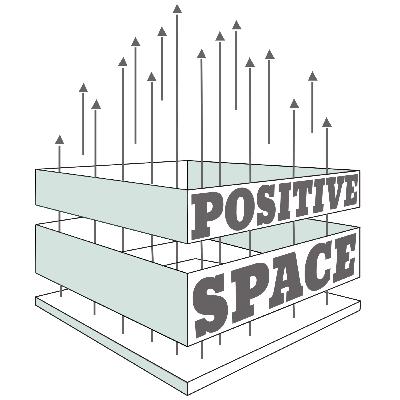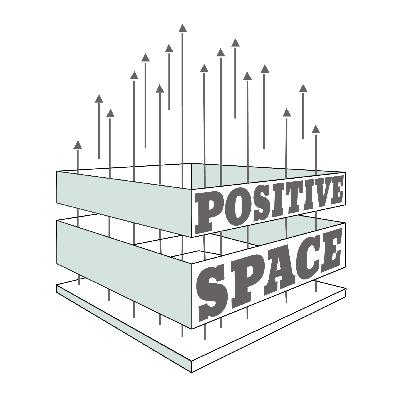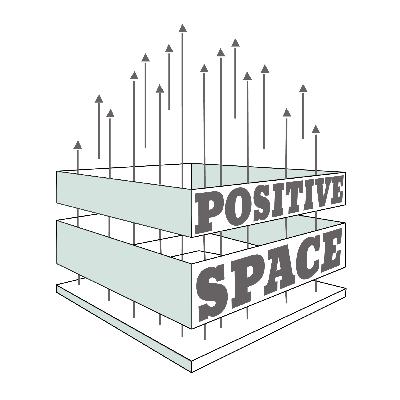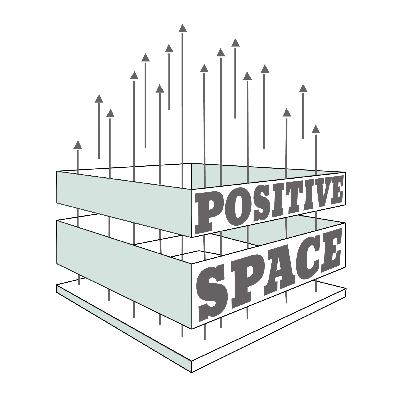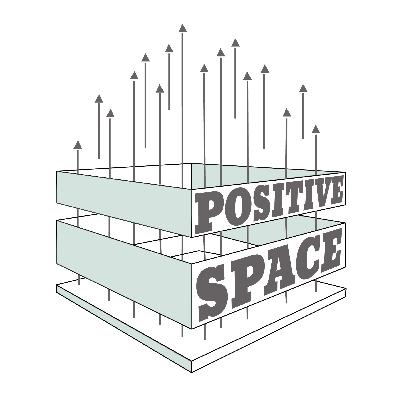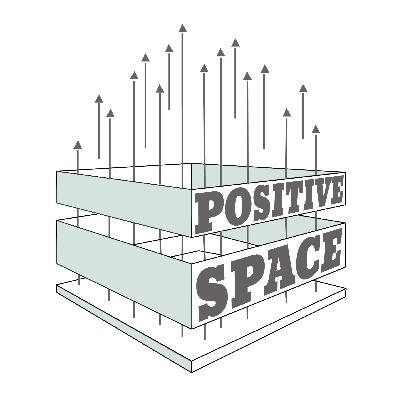Discover Positive Space: Conversation in Art Foundations
Positive Space: Conversation in Art Foundations

Positive Space: Conversation in Art Foundations
Author: Foundations in Art: Theory and Education
Subscribed: 34Played: 162Subscribe
Share
Description
Positive Space is a podcast providing opportunities for those passionate about art foundations to discuss and promote excellence in the development and teaching of college level foundations in art studio and art history classes.
40 Episodes
Reverse
This episode of Positive Space feature interviews with participants in the FATE affiliate session at the Mid-America College Art Association (MACCA) Conference. At the FATE panel, participants were asked to find or think up something that made them uncomfortable and then go do it. Afterwards those participants returned to discuss their uncomfortable situation and what their experience was during and after.
We speak with Andrew McCauley, Vice President of FATE's Biennial Conference. He speaks about the upcoming conference, Foundations in Flux, and all the events surrounding it, how it's different from past conferences what to do in Columbus. Andrew is an Assistant Professor at the Columbus College of Art and Design, where he is the Director of Core Studio.
How can we encourage students to be comfortable in the discomfort of the creative process? How can we stay energized in a field where burn out is very common? We unpack these questions and many more with Professor of Art and Coordinator of Graduate Studies at Bowling Green State University, Michael Arrigo while attending the Mid America College Art Conference [MACAA] in Nebraska, earlier this month.
Positive Space talks with Libby McFalls, Professor of Art and Foundations Coordinator at Columbus State University. She discusses how to change a foundations curriculum by asking "What are we good at?" how to balance life, art and teaching and her role on the board of Integrative Teaching International. She received her MFA in Print Media from Cranbrook Academy of Art (MI) and earned her BFA from Columbus College of Art and Design (OH). Her work has been included in numerous exhibitions nationally, including the Athica Athens Institute, Jaffe and Friede Gallery, Hopkins Center, and the Cade Center for Fine Arts. Additionally, she serves as the VP of Programming for Integrated Teaching International.
Positive Space talks with Guen Montgomery MACAA representative for the FATE Board of Directors. She discusses the changing curriculum at the University Illinois Urbana-Champaign and turns the table on host Valerie Hanks. Guen Montgomery is a multidisciplinary artist whose work investigates identity through studies of gender, regional narrative and family mythology. Guen received her BFA from the University of Hawaii at Manoa, and her MFA in printmaking from the University of Tennessee, Knoxville. Currently Guen lives in Urbana, IL, where she teaches art foundations and printmaking at The University of Illinois, Urbana-Champaign.
Joshua Brinlee discusses his role as Foundations Coordinator at the University of Mississippi, the idea of living in the question and the tenure process.
Joshua Brinlee received his MFA in Studio Art form Memphis College of Art. He was born in Morgan City, Louisiana and grew up in Franklin, Tennessee. Currently, he lives in Memphis, Tennessee and holds the position of Assistant Professor Foundations Coordinator in the Art and Art History Department at the University of Mississippi. He considers himself a multidisciplinary artist and has a deep passion for teaching foundations. Through a variety of media, Brinlee examines and challenges the societal constructs that inform and define culture, gender, and identity.
In this episode Positive Space sits down with Anthony Watkins, Associate Professor of Graphic Design at Sam Houston State University. Watkins discusses foundations effect on Graphic Design, teaching professionalism in his field and inspirations for students.
In this episode Positive Space speaks with Michael Marks, Associate Professor of Art and Foundations Program Coordinator at the South Carolina School of the Arts at Anderson University. Michael discusses the foundations program at Anderson University and the release of FATE in Review.
In this episode Positive Space speaks with Jesse Payne, Head of the Drawing Studio and Assistant Professor in the Art & Design Foundations Department at Virginia Commonwealth University, based in Doha, Qatar. Mr. Payne discusses the opportunities created teaching at an international university.
We discuss creative detours, the mystery of art, becoming comfortable in your own skin as well as the habit and repetition and the true courage it takes to make things, with artist and educator, Gary Setzer, Associate Professor, Division Chair of the First Year Experience at The University of Arizona. While exploring the question many educators are asking “Is (should) Foundations be the same for everyone?” Gary outlines the heart behind the thematic “salad bar” design to his foundations curriculum, which gives students agency, while balancing both craft and content. Each eight week module explores material possibilities while welcoming the value of individual student voices, with this DIY approach to Foundations.
Experimentation is something everyone talks about, but rarely are practical examples of how to implement experimentation within our creative studios and classroom spaces deeply examined. Lily Kuonen, Associate Professor and Foundations Coordinator at Jacksonville University, discusses her artwork which she describes as PLAYNTINGS (play + paintings) and how the element of playful experimentation has become a crucial aspect of her teaching pedagogy. Lily reflects on projects that encourage play, observation and curiosity while unpacking how leaderships roles in Integrative Teaching International (ITI), FATE and SECAC have informed her overall perspective.
This episode was recorded live at the FATE panel at the 106th Annual College Art Association Conference held in Los Angeles. The FATE panel was moderated by Naomi Falk, the FATE CAA Representative.
David Janssen, Jr. is an artist, designer and educator. He is a current third year MFA candidate at the University of Idaho who is graduating in May 2018. He is teaching both foundation level courses in drawing and design, as well as introduction level courses in graphic design and typography. David was a FATE Shout-Out Award Nominee in 2017 and presented on the panel “Should Paneling: Mounting Groovy Presentations” panel during FATE’s Biennial Conference in Kansas City, MO. David earned his BFA in Drawing and Painting from Saginaw Valley State University in Saginaw, Michigan. David has exhibited work nationally for the past several years and has continued to carve his path and sharpen his attention to collage, painting, sculpture and installation. Janssen has accepted his role in the generation of artists pushing forward concept and material collisions. Cultivating experiences from his life, much of David's work critiques and comments on masculinity and recently, his text based work explores the power of words and the residual effects they have on memory and relationships. www.davidjanssenjr.com
Rethinking creativity and being truly open to opportunities - even if they are unfamiliar & across the globe - marks only the beginning of our thoughtful chat with artist and educator Chris Kienke, Chair of the Foundations Curriculum at the School of Art and Design at the University of Illinois at Urbana-Champaign. Chris outlines how his evolving artistic practice has been informed by places/spaces while teaching abroad in the middle east. In addition, we discuss the state of foundations, advise for emerging educators and the navigating the politics of higher education.
Chris Kienke is a visual artist who works with painting, installation and photography. His current project utilizes iconic visual images of Americana. Ideas about patriotism, citizenship and freedom – are represented through these images, which are themselves reflective of class, race, and gender. They shape our beliefs about what American values are and who gets to share in those values. Kienke’s work has been exhibited in over 70 shows including recent solo exhibitions at Fuchs Projects in Brooklyn, NY (2016) Amos Eno Gallery in Brooklyn (2016), the University of Kentucky (2016), the Art Center at the National Central University in Taiwan (2015) and the University of Wisconsin in Osh Kosh (2014). Chris exhibited in the Governors Island Art Fair (2017), Rockford Midwestern Biennial (2014) the 1st Brussels Biennial in 2009 and the Sharjah Biennial in the U.A.E. (2005) His work was included in New American Paintings in September 2009. Kienke has been a fellow at Hospitalfield House in Scotland in 1998-1999 and at the Vermont Studio Center in 2003 and 2007. His work is in the permanent collections ABN Amro Bank in Dubai, Savannah College of Art and Design, Sharjah Art Museum (UAE) and the United Kingdom National Collection. NY. In 2015 Chris was awarded the FATE Emerging Educators Award for teaching. Chris Kienke received his MFA from Southern Illinois University - Carbondale in 2000 and his BFA from the Kansas City Art Institute in 1994. Chris is on the faculty of the School of Art and Design at the University of Illinois at Urbana-Champaign.
Artist, educator & Gallery Director, Shannon Rae Lindsey, reflects on her evolving art practice and how a curiosity of material possibilities has informed her approach to foundations curriculum. In our conversation, Shannon shares practical strategies for encouraging experimentation in the studio classroom, and her passion for the role interdisciplinary collaboration plays within academic gallery spaces.
A dynamic conversation with Susan Altman, artist and educator at Middlesex County College. We discuss how she has seen education change in her over thirty years of experience in the classroom, projects she is excited about, and the benefits of working at a community college.
Awakening students to their passion, while bringing the fullness and honesty of his experiences into the studio classroom, Brian Hitselberger, Assistant Professor of Painting and Printmaking at Peidmeont College, reflects on his habits as an artist and his values as an educator. We discuss virtuosity, vulnerability, the value of guest critics and how having conversations with students about tattoos can act as a gateway to discussing symbolic representation. In addition, Brian presents thoughtful and sincere personal reflections on his role as a parent and the reality of being a gay man living in the South.
A dynamic conversation with artist & educator, Meredith Starr, Assistant Professor of Visual Arts, The State University of New York (SUNY) Suffolk County Community College. We discuss her recent FATE regional event, staying observant, as well as her upcoming paper presentation at CAA in February. She shares a recent informal experiment she conducted with her Fall 2017 Drawing 1 sections. One section focused on the quality of their drawings-producing fewer drawings while spending more time on each drawing. The other section focused on producing a large quantity of quicker drawings during the semester. It will be challenging to avoid being inspired by Meredith’s enthusiasm, while she offers many tips & posses thoughtful questions about how creativity informs our daily lives as artists & educators.
Positive Space followed up with Meredith to discuss which class was more successful the drawing I section that focused on the quality of their drawings or the other section which focused on a large quantity of drawings.
"Of course there were the students who were already extremely talented in both sections who weren’t really affected by the experiment. Or the students who weren’t going to work hard no matter which scenario they found themselves in. In the end, I would say all students felt successful and definitely progressed, but the ones who significantly improved technically were the ones working on more projects because they were drawing more consistently. And in general, the students in the section with more time on each project developed stronger skills in divergent thinking and being able to really talk about art - which are arguably equally important skills. I’d be curious to see if anyone else has tried something similar in their courses. I’d also want to try this again with Drawing II sections- where students have spent some time away from high school and the idea of working towards “the project” so that they might find themselves more compelled to put it in significant effort to sketches, drafts and revisions. For me, I think the most exciting aspect of this experiment was how committed the students were to wanting to grow as artists and how hopeful I am that this speaks to the Post-Millennials recognizing the importance of studying Foundations!”
Positive Space is a podcast created by Foundations in Art: Theory and Education (FATE). Positive Space is hosted by Valerie Powell and engineered by Raymond Gaddy.
Jessica Mongeon, Visiting Assistant Professor of Studio Foundations at Arkansas Tech University, discusses student habits, using technology in the classroom & strategies for creating inclusive learning environments at a time when social & political issues often alienate many.
Unpacking trends in foundations pedagogy, Emily Ward Bivens, Professor of Time-Based Art at the University of Tennessee, discusses the benefit of introducing students to performative activites, mentorship approaches that avoid forced or cheesy obligation and the challenges and adventures involved of juggling the role of artist, educator and administrator.



